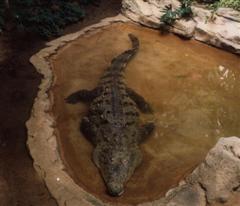Crocodile - American
Central American Alligator, American Saltwater Crocodile Scientific Name: Crocodylus acutus
Wed, 2nd July, 2025 - 7:57 pm GMT
Sponsor Ads:

Alternative Name
Central American Alligator, American Saltwater Crocodile Scientific Name: Crocodylus acutusBasic Info
A mature American Crocodile usually measures between five and six meters, although seven-meter animals have been reported. They are usually olive brown in color and have silver irises. Younger animals tend to be lighter or tan in color. Banding is often visible over their tails and bodies. Very old animals may be almost gray in color. American Crocodiles have little knobs in front of each eye. They tend to have less dorsal armor than a number of other crocodiles, and the plates that are present are irregular. Their snouts are tapered and their bodies are slender. American Crocodiles have between 66 and 68 teeth.
Health
American Crocodiles require large habitats involving both land and water areas. Water should be freshwater, particularly for young animals and hatchlings that cannot tolerate high levels of salinity. Because of their large size, American Crocodiles are potentially dangerous even if they are not overtly aggressive and should be handled with caution. Breeding The courtship for American Crocodiles can last up to two months and occurs in spring or early summer. Usually, it is the female that initiates mating behavior. Females will build nests according to the habitat they live in. Where sandy embankments are available, American Crocodiles will dig burrow-like nests. In areas that flood readily, American Crocodiles will construct tall mound nests to elevate their eggs. On average, 38 eggs are laid, though numbers between 20 and 60 have been reported. At the beginning of the rainy season the eggs hatch, usually about 90 days after they were deposited. Hatchlings are about 25 centimeters long. Although varying degrees of care and protection from the adults have been observed, the greenish colored hatchlings usually leave the area where they were hatched within a few days.Habitat
Commonly found in tropical wetland areasBehavior
American Crocodiles are rather adaptable and will dig burrows into embankments in harsh or adverse conditions. They aestivate in these dens until conditions become more favorable. If the area where American Crocodiles live becomes uninhabitable, they will travel for surprising distances over land areas to find new homes. They can live in both brackish and freshwater. In colder weather, American Crocodiles usually move inland or become largely inactive.Origin
Central and South AmericaHistory
The American Crocodile is native to the central region of the Americas, ranging through Central America up into southern areas of North America and down into more temperate regions of South America. They are most commonly found in tropical wetland areas. Although once endangered, the IUCN status of the American Crocodile has been revised, and this reptile is now listed as a vulnerable species. In certain areas of its range, however, it remains endangered. It was heavily hunted in the mid twentieth century for its skin, and today is often forced out of areas it previously inhabited due to human disturbance, poaching, and habitat loss. The American Crocodile is farmed and conservation programs are underway.Common Foods
American Crocodiles feed at night on a variety of animals including fish and birds.Sponsor Ads:
"The robbed that smiles steals something from the thief". Othello Act I, Scene III, William Shakespeare
Crocodile - American
Coded by: BGID® | ALL RIGHTS RESERVED Copyright © 2000-2025
Disclaimer | Privacy | Report Errors / Contact | Credits
















